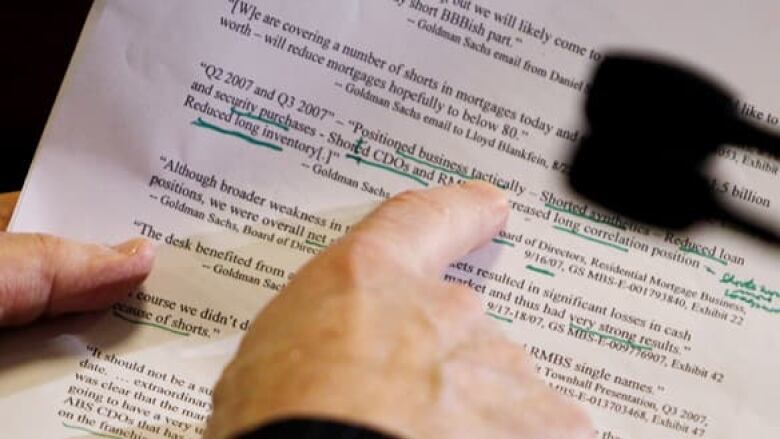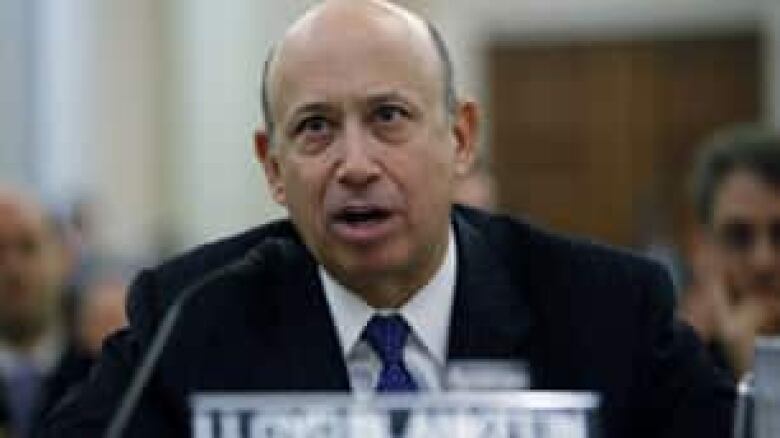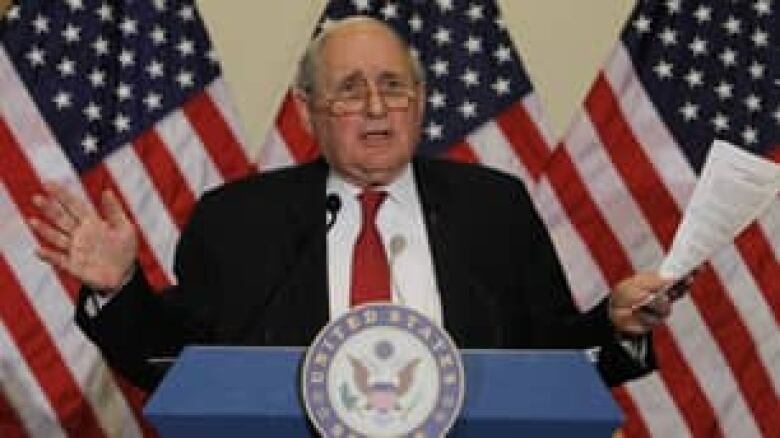Goldman execs face hostile Senate crowd
U.S. firm accused of misleading investors in mortgage securities

Executives from the investment firm Goldman Sachs appeared before a testy panel of U.S.senators Tuesday to face allegations the companybet against its own customersand profited from the housing meltdown at their expense.
In several hostile exchanges, investigators for the Senate's permanent subcommittee of investigationsaccused Goldman executives, including the CEO, of misleading investors in complex mortgage securities that turned toxic.
TheSecurities and Exchange Commissionhas chargedGoldman with civil fraud in its handling ofthose securities tied to home loans.
Senator Carl Levin, a Democrat from Michigan, is the committee's chair. When questioning began, he took aim at Daniel Sparks, the 42-year-old former head of the bank's mortgage division until he resigned in April 2008 for personal reasons.
Levin singled out a Goldman email from a high-ranking employee in June 2007, who described a collateralized debt obligation known internallyas "Timberwolf" as "one shitty deal."
"How much [of Timberwolf] did you sell after that date, June 22,when your people, internally, knew it was a shitty deal?" Levin asked Sparks.
WhenSparks replied he could not recall, Levin testily informed him that Goldman sold hundreds of millions of dollars' worth after that point.
'You ought to have plenty of regrets' Senator Carl Levin toDaniel Sparks
"If you can't give a clear answer to that one, I don't think we're going to get very many clear answers from you," Levin said, dismissing Sparks from questioning.
"You've got no regrets?" Levin asked Sparks. "You ought to have plenty of regrets. I don't think you're going to acknowledge them but that's why we need to have regulation."
SEC launches suit
The investigatorspoint to a trove of two million emails and other Goldman documents obtained in an 18-month investigation.
In its fraud allegation, the SEC says Goldman Sachs concocted mortgage investments without telling buyerstheyhad been put together with help from a hedge fund client, Paulson & Co., that was betting on the investments to fail.
The testimony by CEO Lloyd Blankfein and the others begana little after 10 a.m. ET. Blankfein told the subcommittee Goldman didn't bet against its clients and can't survive without their trust.
"While we strongly disagree with the SEC's complaint, I also recognize how such complicated transactions may look to many people," he said.

"There is something unseemly about Goldman betting against the housing market at the same time it is selling to its clients mortgage-backed securities containing toxic loans," RepublicanSenator Susan Collins of Maine said.
"It is also unsettling to see emails celebrating these actions," she said, areference to scandalous emails written by Goldman trading executiveFabrice Tourre that emerged this week,in whichTourre appeared to be boasting of his financial wizardry even as the crisis worsened.
Tourre is scheduled to testify later Tuesday. Federal regulators say he marketed an investment designed to lose value. Tourre famously called himself in a January 2007 email "the fabulous Fab ... standing in the middle of all these complex ... exotic trades he created."
Tourre categorically denied the Securities and Exchange Commission's allegations that any of the complex investment vehicles he created were designed to fail.
"I have been the target of unfounded attacks on my character and motives," he said. "I appreciate the opportunity to appear before the subcommittee to answer these false charges."

Both Goldman and Tourre say they will contest the SEC's charges in court.
Blankfein repeated the company's assertion that it lost $1.2 billion US in the residential mortgage meltdown in 2007 and 2008 that touched off the financial crisis and a severe recession.
He argued that Goldman wasn't making an aggressive negative bet or short on the mortgage market's meltdown.
"We didn't have a massive short against the housing market and we certainly did not bet against our clients," Blankfein said. "Rather, we believe that we managed our risk as our shareholders and our regulators would expect."
But Levin saidhe thinks "they're misleading the country.... There's no doubt they made huge money betting against the (mortgage) market."
Goldman "knew of Paulson's involvement in the selection" of securities, Levin told said. "They knew Paulson was going short."
Goldman has fought back against the fraud charges with a public relations blitz aimed at discrediting the SEC's case and repairing the bank's reputation. Some big clients are publicly backing the firm, but its stock has yet to recover from the fall that followed the SEC lawsuit on April 16.
Emails showprogression of crisis
The subcommittee provided excerpts of emails showing a progression from late 2006 through the full-blown mortgage crisis a year later. Levin said they show Goldman shifted in early 2007 from neutral to a short position, bettingthe mortgage market was likely to collapse.
"That directional change is mighty clear," Levin said. "They decided to go gangbusters selling those securities" while knowing they were toxic.
"We have a big short on," Tourre wrote in a December 2006 email. In a separate email, Sparkswrote to other executives in March 2007, "We are trying to close everything down, but stay on the short side."
The issue of how much Goldman executives pushed such policies and were aware of the mortgage trading department's practices is a key one emerging before the Senate hearing.
The 140-year-old investment house's trading strategy in recent years enabled it to weather the financial crisis better than most other biginvestment banks. It earned a blowout $3.3 billion US in the first quarter of this year.
Goldman denies accusations
Even before the SEC filed its fraud charges, Goldman denied that it bet against clients by selling them mortgage-backed securities while reducing its own exposure to them by taking short positions.
By the Senate subcommittee's reckoning, Goldman made about $3.7 billion US from its short positions in several complex mortgage securities called collateralized debt obligations in 2006-2007. The short positions made up about 56 per cent of its total risk during the period, the investigators found.
'If our clients believe that we don't deserve their trust, we cannot survive.' CEO Lloyd Blankfein
But the company says it lost $1.2 billion US when it sold home mortgage securities in 2007 and 2008.
According to a November 2007 internal Goldman email: "Of course we didn't dodge the mortgage mess. We lost money, then made more than we lost because of shorts."
In addition to the $2 billion US collateralized debt obligation that's the focus of the SEC's charges against Goldman, the subcommittee analyzed five other such transactions, totalling around $4.5 billion US.
All told, they formed a "Goldman Sachs conveyor belt," the Senate panel said, that dumped toxic mortgage securities into the bloodstream of the financial system.
The firm's correspondence to the SEC dated Oct. 4, 2007, includes this: "During most of 2007, we maintained a net short subprime (mortgage) position and therefore stood to benefit from declining prices in the mortgage market."
In his prepared remarks, Blankfein acknowledged, "We have to do a better job of striking the balance between what an informed client believes is important to his or her investing goals and what the public believes is overly complex and risky."
He added, "If our clients believe that we don't deserve their trust, we cannot survive."
With files from The Associated Press












_(720p).jpg)


 OFFICIAL HD MUSIC VIDEO.jpg)
.jpg)



























































































